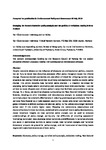Changing the Record: Narrative policy analysis and the politics of emissions trading in New Zealand
| dc.contributor.author | Bailey, Ian | |
| dc.contributor.author | Jackson Inderberg, TH | |
| dc.date.accessioned | 2019-08-05T09:33:47Z | |
| dc.date.issued | 2019-08-16 | |
| dc.identifier.issn | 0961-0405 | |
| dc.identifier.issn | 1756-9338 | |
| dc.identifier.uri | http://hdl.handle.net/10026.1/14743 | |
| dc.description.abstract |
<jats:title>Abstract</jats:title><jats:p>Despite extensive debate on the influence of discourse on environmental politics, research has yet fully to reveal how discursive processes affect policy change on issues like climate change. Discourse‐related approaches are also often criticised for critiquing current policy situations but paying limited attention to utilising communication studies to enable policy change. This article explores how narrative policy analysis—a linguistic technique for analysing policy issues where uncertainty and complexity have bred polarisation—can be utilised to recast disputes over climate policy in ways that facilitate compromise and policy change. As a focus, we examine disputes surrounding the New Zealand Emissions Trading Scheme, drawing on elite interviews and documentary analysis to analyse contrasting narratives about the scheme's effectiveness in reducing greenhouse‐gas emissions. The first portrays New Zealand as a trade‐exposed country that makes only minor contributions to global emissions to defend cautious and low‐cost policy. Its rival advocates stronger domestic action even if this entails higher costs. Mapping the contentions, assumptions, and characterisations in these narratives, combined with analysis of recent policy developments, reveal important insights on how narrative policy analysis can be used to enhance understandings of policy change, particularly, the difficulties of attacking opponents' “anchoring narratives”; how analysing minor narratives and differences in narrative alliances can assist in overcoming barriers to policy change; how narrative changes and “narrative diplomacy” prepare the ground for policy change; and the importance of examining issues neglected in polarised debates on climate policy.</jats:p> | |
| dc.format.extent | 409-421 | |
| dc.language | en | |
| dc.language.iso | en | |
| dc.publisher | Wiley | |
| dc.subject | discourse | |
| dc.subject | emissions trading | |
| dc.subject | narrative policy analysis | |
| dc.subject | New Zealand | |
| dc.subject | policy change | |
| dc.title | Changing the Record: Narrative policy analysis and the politics of emissions trading in New Zealand | |
| dc.type | journal-article | |
| dc.type | Journal Article | |
| plymouth.author-url | https://www.webofscience.com/api/gateway?GWVersion=2&SrcApp=PARTNER_APP&SrcAuth=LinksAMR&KeyUT=WOS:000481400600001&DestLinkType=FullRecord&DestApp=ALL_WOS&UsrCustomerID=11bb513d99f797142bcfeffcc58ea008 | |
| plymouth.issue | 6 | |
| plymouth.volume | 29 | |
| plymouth.publication-status | Published | |
| plymouth.journal | Environmental Policy and Governance | |
| dc.identifier.doi | 10.1002/eet.1868 | |
| plymouth.organisational-group | /Plymouth | |
| plymouth.organisational-group | /Plymouth/Faculty of Science and Engineering | |
| plymouth.organisational-group | /Plymouth/Faculty of Science and Engineering/School of Geography, Earth and Environmental Sciences | |
| plymouth.organisational-group | /Plymouth/REF 2021 Researchers by UoA | |
| plymouth.organisational-group | /Plymouth/REF 2021 Researchers by UoA/UoA14 Geography and Environmental Studies | |
| plymouth.organisational-group | /Plymouth/Users by role | |
| plymouth.organisational-group | /Plymouth/Users by role/Academics | |
| dcterms.dateAccepted | 2019-07-30 | |
| dc.rights.embargodate | 2021-8-15 | |
| dc.identifier.eissn | 1756-9338 | |
| dc.rights.embargoperiod | Not known | |
| rioxxterms.versionofrecord | 10.1002/eet.1868 | |
| rioxxterms.licenseref.uri | http://www.rioxx.net/licenses/all-rights-reserved | |
| rioxxterms.licenseref.startdate | 2019-08-16 | |
| rioxxterms.type | Journal Article/Review |


